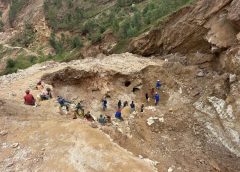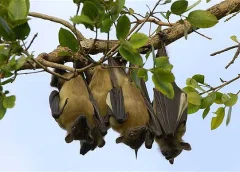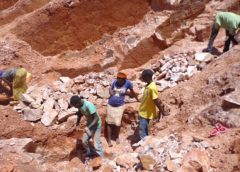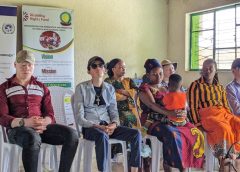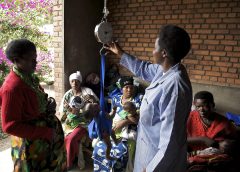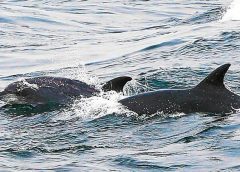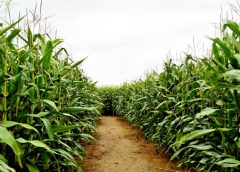Dans les collines verdoyantes du Rwanda, derrière les discours de croissance verte et de développement durable se cache une réalité aussi brutale qu’invisible: Celle de l’exploitation minière illégale. Alimentée par la pauvreté, tolérée par les silences officiels et orchestrée dans l’ombre par des réseaux bien organisés, elle saigne le pays, tue ses enfants, détruit son écosystème et alimente l’industrie mondiale de l’électronique. Plongée au cœur d’un enfer souterrain où la quête de survie côtoie le cynisme institutionnel et la crise climatique. À l’aube, dans la brume du district de Rutsiro,…
SOMA INKURUCategory: Ibidukikije
Rwanda : Haratabarizwa uducurama turi mu nzira zo gicika
Muri parike ya Nyungwe habonetse ubwoko bw’uducurama buzwi nka “Rhinolophus hilli”, hakaba hasabwe ko hashyirwaho gahunda yo kubungabunga utu ducurama aho tugaragara hose mu gihugu kuko turi mu bwoko bw’uturi mu nzira zo gucika. Ibi bikaba byatangajwe n’abashakashatsi ndetse banemeje ko ari ku nshuro ya mbere habonetse muri parike ya Nyungwe ubundi bwoko bwa “Damara Wolly” bwari bwabonetse mu 1981. Kugeza ubu mu Rwanda hakaba hamaze kuboneka uduce 80 turimo uducurama two mu bwoko bunyuranye. Abashakashatsi bagaragaza ko uducurama dufite akamaro kanini cyane kuko turya udukoko, tugafasha no mu kubangurira…
SOMA INKURUE-Mobility in Rwanda: A dream for secondary cities amid infrastructure challenges
By Diane NIKUZE NKUSI Rwanda is aggressively pushing for e-mobility to combat rising air pollution and safeguard public health. With vehicle numbers increasing by nearly 12% annually and emissions emerging as a primary urban pollutant, the government has set ambitious targets for a cleaner future. The plan involves converting 30% of motorcycles, 8% of cars, 20% of buses, and 25% of mini-buses to electric by 2030 a transition estimated to cost around $900 million. The initiative is expected to yield significant reductions in greenhouse gas emissions, with projections suggesting reductions…
SOMA INKURUGisagara: Abahinzi b’umuceri bararirira mu myotsi
Umuyobozi w’Akarere ka Gisagara wungirije ushinzwe iterambere y’ubukungu, Habineza Jean Paul, yatangaje ko imvura yaguye cyo kuwa 15 Werurwe 2025, yangije umuceri kuri hegitari zisaga 100. Ati “Umwuzure wibasiye igishanga cya Ngiryi muri Musha, ariko si ho gusa kuko no mu murenge wa Kibilizi muri Duwani naho hageze umwuzure mu gishanga.” Yakomeje agira ati “aho muri Ngiryi hangiritse hegitari zisaga 80, mu gihe kuri Duwani hangiritse hegitari ziri hafi ya 20.” Habineza yavuze ko ibyangijwe n’imvura bitari byagafatiwe ubwishingizi bw’ibihingwa, kuko bari babanje gukusanyiriza amafaranga hamwe bitegura kujya kubusaba mu…
SOMA INKURUThe Impact of Illegal Stone Quarrying on Health in Muhanga district
BY Diane NIKUZE NKUSI In the heart of Rwanda’s Central Province, Muhanga District is home to breathtaking landscapes and a community that relies heavily on natural resources, especially stones and gravel, for their livelihoods. However, a growing concern is emerging in this region illegal stone quarrying, which has not only become a source of income for many but is also taking a severe toll on public health. In this article, we explore the destructive impact of illegal quarrying on the environment, the health of workers, and the surrounding community, through…
SOMA INKURUClimate Change and Albinism: The Struggles of People with Albinism in Rwanda
As the climate continues to change, populations living with albinism in Rwanda disproportionately feel its effects. Albinism is a genetic condition that results in the absence of melanin in the skin, hair, and eyes, making individuals with albinism extremely sensitive to the harmful effects of the sun. As a result, they face an increased risk of skin cancer, which has become one of the most serious health concerns for them. In Rwanda, the negative effects of climate change, with rising temperatures and intense sun exposure making their lives even harder,…
SOMA INKURUClimate Change and Malnutrition: A Growing Crisis for Stunted Growth in Rwanda
Rwanda, known as the “Land of a Thousand Hills,” is facing an alarming crisis as climate change intensifies its impact on agriculture, food security, and ultimately, the growth and development of children. Stunting, a condition where children fail to grow to their full potential due to malnutrition, has long been a challenge in the country. However, with changing weather patterns, the crisis is escalating, affecting the future of a generation. The effects of climate change on agriculture have led to reduced crop yields, erratic rainfall, and food shortages directly contributing…
SOMA INKURULe golfe de Gascogne de nouveau fermé à la pêche pendant un mois pour protéger les dauphins
Environ 300 bateaux resteront à quai, du 22 janvier au 20 février dans le golfe de Gascogne, en contrepartie d’une indemnisation gouvernementale. Cette mesure, déjà ordonnée l’an passé par le gouvernement français, vise à faire baisser le nombre de dauphins morts par capture accidentelle. Arrêter la pêche pendant quatre semaines pour préserver les dauphins : la mesure, qui a contribué à diviser par quatre les captures accidentelles de petits cétacés l’hiver dernier, est reconduite à partir de mercredi 22 janvier dans le golfe de Gascogne. Du Finistère à la frontière…
SOMA INKURUÀ Los Angeles, les pompiers qui combattent les incendies s’inquiètent de vents forts
Alors que les deux principaux feux de Los Angeles sont désormais contenus à plus de 50 %, les pompiers américains se préparent à un retour de vents forts lundi. Le président élu Donald Trump a déclaré, lors d’un meeting, qu’il se rendra sur place vendredi. Les pompiers américains qui combattent les incendies qui ravagent Los Angeles depuis des jours et tué au moins 27 personnes se préparent à un retour de vents forts lundi 20 janvier, le gouverneur de Californie disant espérer qu’il s’agisse du “dernier” épisode similaire. Les deux…
SOMA INKURUThe benefits of GMOs in agriculture and famine prevention
In recent decades, the debate around genetically modified organisms (GMOs) has evolved into a central topic in global agriculture. With a rapidly growing population and the increasing threats posed by climate change, GMOs are seen by many as a crucial tool for addressing food security and ensuring sustainable agricultural practices. This article delves into the benefits of GMOs in agriculture, particularly in the context of preventing famine and alleviating hunger in vulnerable regions. The role of GMOs in enhancing agricultural productivity GMOs have been engineered to address specific challenges that…
SOMA INKURU

